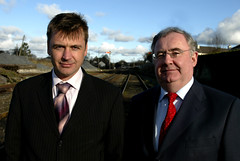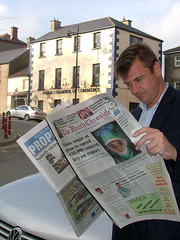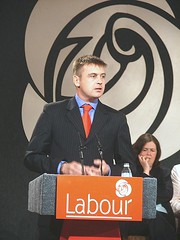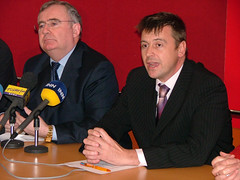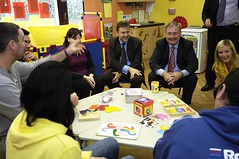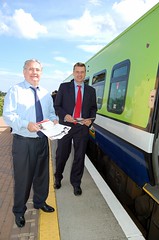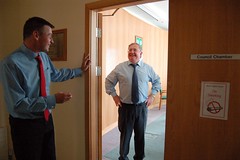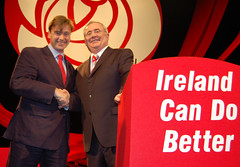Tuesday, December 15, 2009
Looking for Solutions from Copenhagen
This article appeared in The Irish Daily Mirror on 14th December 2009
If we were in any doubt as to what climate change could mean to Ireland then last month’s floods will have washed that away. Cities, towns and rural areas across the country were underwater for days. Normal life was put on hold. That’s why this month’s conference of 110 world leaders in Copenhagen is so important. We need to agree together on measures to take that will protect our planet and our people.
Copenhagen is an excellent choice for the conference. World leaders will be impressed by the public transport system and by how easy it is to walk and cycle around. The Danes have been doing eco-friendly for decades.
The organisers have brought the conference onto the city’s streets. Dotted around the city are climate change event tents. In one of the city’s biggest squares, Kongens Nytorv, a tent hosts a photographic exhibition called “Hard Rain”, named after the Bob Dylan song. Each line from Dylan’s song is represented by hard-hitting pictures from around the world, illustrating the impact of climate change, poverty and inequality. The book, also called Hard Rain, will be a great present for a few friends for Christmas.
The impact of climate change on our coasts is particularly worrying. Ireland could face a rise in sea levels of half a metre by the end of the century, meaning that many of our coastal towns and villages would have to be abandoned. My local scout group from East Meath recently came into Leinster House to express their worries about the impact of rising sea levels in Laytown and Bettystown. The issue faces many communities across the world. Some islands, such as the Maldives, and Tuvalu, could disappear altogether.
To highlight this issue Friends of the Earth arranged for thousands of people to turn up dressed in blue outside the Danish Parliament. I joined this ocean of people. To make a wave we all knelt down and then first the front section of the crowd stood up, then the middle section stood up and then the back section. We repeated this a few times, mimicking giant blue waves hitting the sea shore.

Campaigners take to the streets in Copenhagen
Around the city thousands of campaigners and pressure groups are hosting and attending events like these, trying to make their voices heard. The vast numbers of TV and media people are helping to get that message on the world stage too. The crowds on the streets are mostly young and seem to be good-natured. However the local police are taking no chances. Police vans are everywhere. On every pavement are officers armed with what appear to me to be tear-gas canisters. They look like they mean business.

Police Wagons at the ready
At the Klima centre the range of climate change workshops and seminars is impressive (think of The Late Late Christmas Toy Show for environmentalists). Their aim is to showcase how local communities can work to make a difference in their own town or village.
One seminar focused on how sheep farmers in North Wales got together to form a co-operative to erect three wind turbines to provide electricity for 1,600 homes. The project has been so successful that the farmers plan to put up another seven turbines, in the process generating enough energy to power a further 7,000 Welsh homes. For me it shows that local people, acting as a community, can really make things happen.
That was also the message from Nobel Peace Prize winner Professor Wangari Maathai, who spoke to us at an evening seminar in the Danish Film Institute. She won the 2004 peace prize for setting up Kenya’s Green Belt Movement, which has planted over 35 million tress in Kenya and helped to combat illegal logging and deforestation.
I raised this issue in Leinster House a couple of months ago. I want our Government to stop using illegally logged timber in public buildings. The answer I got from the Minister was that “he would look at it”. After listening to what Professor Maathai said I’m going to table a parliamentary question next week to try to put pressure on the government to do this sooner rather than later.
Professor Maathai’s advice on what each individual can do is clear. She says that we cannot just leave matter to the politicians. Action by people in their own communities, combined with political will at a national and international level is what is needed, and it’s needed soon. As Martin Luther King once said, we are faced with the Fierce Urgency of Now. That should be the message coming out of Copenhagen.
If we were in any doubt as to what climate change could mean to Ireland then last month’s floods will have washed that away. Cities, towns and rural areas across the country were underwater for days. Normal life was put on hold. That’s why this month’s conference of 110 world leaders in Copenhagen is so important. We need to agree together on measures to take that will protect our planet and our people.
Copenhagen is an excellent choice for the conference. World leaders will be impressed by the public transport system and by how easy it is to walk and cycle around. The Danes have been doing eco-friendly for decades.
The organisers have brought the conference onto the city’s streets. Dotted around the city are climate change event tents. In one of the city’s biggest squares, Kongens Nytorv, a tent hosts a photographic exhibition called “Hard Rain”, named after the Bob Dylan song. Each line from Dylan’s song is represented by hard-hitting pictures from around the world, illustrating the impact of climate change, poverty and inequality. The book, also called Hard Rain, will be a great present for a few friends for Christmas.
The impact of climate change on our coasts is particularly worrying. Ireland could face a rise in sea levels of half a metre by the end of the century, meaning that many of our coastal towns and villages would have to be abandoned. My local scout group from East Meath recently came into Leinster House to express their worries about the impact of rising sea levels in Laytown and Bettystown. The issue faces many communities across the world. Some islands, such as the Maldives, and Tuvalu, could disappear altogether.
To highlight this issue Friends of the Earth arranged for thousands of people to turn up dressed in blue outside the Danish Parliament. I joined this ocean of people. To make a wave we all knelt down and then first the front section of the crowd stood up, then the middle section stood up and then the back section. We repeated this a few times, mimicking giant blue waves hitting the sea shore.

Campaigners take to the streets in Copenhagen
Around the city thousands of campaigners and pressure groups are hosting and attending events like these, trying to make their voices heard. The vast numbers of TV and media people are helping to get that message on the world stage too. The crowds on the streets are mostly young and seem to be good-natured. However the local police are taking no chances. Police vans are everywhere. On every pavement are officers armed with what appear to me to be tear-gas canisters. They look like they mean business.

Police Wagons at the ready
At the Klima centre the range of climate change workshops and seminars is impressive (think of The Late Late Christmas Toy Show for environmentalists). Their aim is to showcase how local communities can work to make a difference in their own town or village.
One seminar focused on how sheep farmers in North Wales got together to form a co-operative to erect three wind turbines to provide electricity for 1,600 homes. The project has been so successful that the farmers plan to put up another seven turbines, in the process generating enough energy to power a further 7,000 Welsh homes. For me it shows that local people, acting as a community, can really make things happen.
That was also the message from Nobel Peace Prize winner Professor Wangari Maathai, who spoke to us at an evening seminar in the Danish Film Institute. She won the 2004 peace prize for setting up Kenya’s Green Belt Movement, which has planted over 35 million tress in Kenya and helped to combat illegal logging and deforestation.
I raised this issue in Leinster House a couple of months ago. I want our Government to stop using illegally logged timber in public buildings. The answer I got from the Minister was that “he would look at it”. After listening to what Professor Maathai said I’m going to table a parliamentary question next week to try to put pressure on the government to do this sooner rather than later.
Professor Maathai’s advice on what each individual can do is clear. She says that we cannot just leave matter to the politicians. Action by people in their own communities, combined with political will at a national and international level is what is needed, and it’s needed soon. As Martin Luther King once said, we are faced with the Fierce Urgency of Now. That should be the message coming out of Copenhagen.

